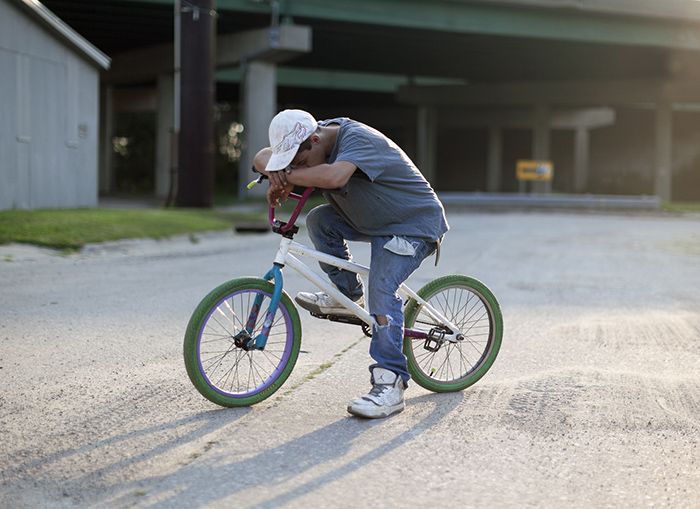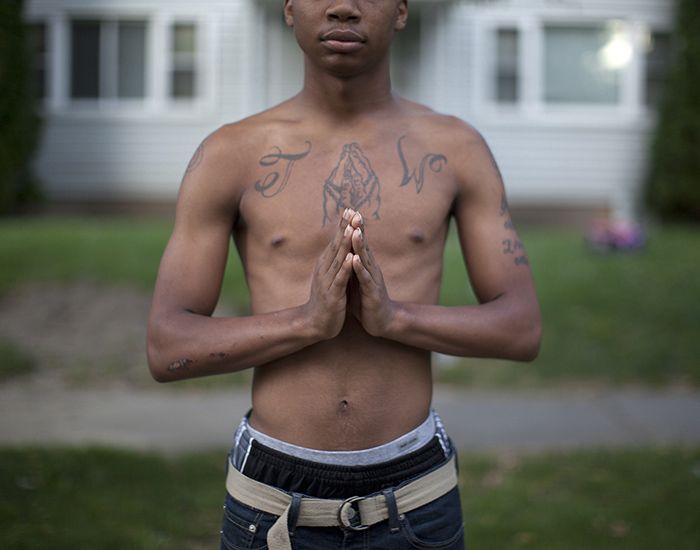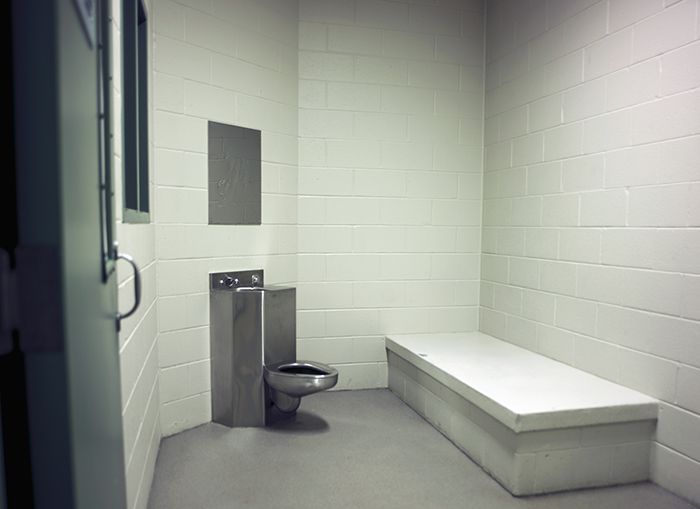blog
Interview with photographer Zora J Murff

Nick at 16
F-Stop Magazine: How did you first become involved in photography and what led you to working in this medium as an artist?
Zora J Murff: I started using photography as a creative outlet. I took a couple of introductory courses at a community college and my love for it grew from there. It became a big pat of my life, and I decided that working with photography was something that I needed to do.
F-Stop: The Portfolio Issue 2014 of F-Stop Magazine includes images from your project “Corrections”. Can you tell us about this project? What led to this project?
ZJM: I have a degree in Psychology, and my professional experience in the human service field led me to a position as a tracker with Linn County Juvenile Detention and Diversion Services, working with youths on probation. One service that we provide is electronic monitoring, and one of the kids that I worked with was assigned an electronic monitoring unit (ankle monitor). He became upset about it one day, telling me, “This fucking thing is an invasion of my privacy and goes against my well being.” Our conversation and his anger really made me think about the juvenile justice system as a whole, especially the conflict that rises between the youths and service providers, as well as between the system and the outcomes it is meant to reach. It was around this time that I was taking a photography class in which we were required to make a cohesive body of work, and “Corrections” took off from there.

Lucas at 15
F-Stop: Can you discuss your process for making these images or your creative process more generally? How do you choose what to photograph? What are you looking to capture?
ZJM: I was most excited about the portraiture, and that was also the most challenging part of making the series as I was not allowed to photograph the youths’ faces. I would ask them if they wanted to participate and then it became a collaborative effort. Making “Corrections” was all about attempting to document the youths’ experiences. A lot of the work was a result of spending time and having conversations with the youths. We would discuss why they felt they had done the things they had, how they felt about it now that it had led them to being placed on probation, or how they felt about their probationary expectations. Using that information was how I would create ideas for photographs. The youths became symbolic of their experiences and our interactions, and I attempted to inject a bit of their personalities into the photographs. I would visit the places they had committed crimes and would take photographs that I felt spoke to what happened there.
F-Stop: What do you hope people see or feel or perhaps learn when looking at your photographs?
ZJM: I hope to elicit some sort of empathic understanding. I have had a lot of responses from people who have had some experience in the system firsthand or secondhand, and they recall the things that they have been through and how the system either helped or hurt. For people who have no experience of the juvenile justice system whatsoever, I want to open up this world to them and hopefully start a dialogue. It is easy to stereotype these kids as bad, place them in the system, and write them off assuming that they will be “fixed.” I want my photographs to be a reminder that these people still exist, and that what they are going through is real.

Jaeshawn at 16
F-Stop: Do you have a favorite image in this series? If so, which one and why is it the image that speaks to you most?
ZJM: One of my favorite photographs is Jaeshawn at 16. I started working with Jaeshawn about six months ago. He was arrested with two other youths for burglarizing a house, one of them possessing a handgun. Throughout the time I have worked with Jaeshawn, I have watched him develop from being guarded and blaming others for his actions to becoming more responsible and accountable. However, he is still very closed off about the crime he committed. While taking his portrait, I asked him why he had decided to break into the house and his response was very similar to the first time I had asked him, “I don’t have an answer for that question. I don’t like to talk about it. Whenever someone asks me about it, I don’t say anything.” Jaeshawn’s portrait is one that I feel perfectly addresses the key underlying concept to “Corrections”: the conflict between adolescent innocence and delinquency. His response provides us with evidence of how service providers in the system strive to assist youths to confront what they have done and to make positive changes, but often the outcome is ambivalence. I attempted to make this a part of his portrait and I feel that I got close.
F-Stop: Are you working on any other project currently?
ZJM: I am doing research about the Wellington Heights neighborhood in Cedar Rapids, where I live. It is a highly stigmatized neighborhood where the crime rate has increased and it is considered the low-income neighborhood of Cedar Rapids. The neighborhood association has started to re-brand it as “New Wellington,” putting up two large signs with no other information available about what “New Wellington” is. My intent is to look at Wellington’s blue-collar past, its current state, and what its possible future may be.

Holding Room, Linn County Juvenile Detention Center
F-Stop: What photographers or other artists inspire you?
ZJM: A big source of inspiration for me is my professor, Jeff Rich. Jeff has continued to push me to make my work better and put myself out there. He was integral to the making of “Corrections” and provided a lot of support along the way. Another source of inspiration for me is Joshua Dudley Greer. When I first considered pursuing photography, Joshua’s was some of the first work that I looked at, and after seeing his work, I knew that photography was what I wanted to do.
For more of Zora J Murff’s work: F-Stop Magazine, www.zora-murff.com
Location: Online Type: Featured Photographer, Interview
Events by Location
Post Categories
Tags
- Abstract
- Alternative process
- Architecture
- Artist Talk
- artistic residency
- Biennial
- Black and White
- Book Fair
- Car culture
- Charity
- Childhood
- Children
- Cities
- Collaboration
- Community
- Cyanotype
- Documentary
- Environment
- Event
- Exhibition
- Faith
- Family
- Fashion
- Festival
- Film Review
- Food
- Friendship
- FStop20th
- Gender
- Gun Culture
- Habitat
- Hom
- home
- journal
- Landscapes
- Lecture
- Love
- Masculinity
- Mental Health
- Migration
- Museums
- Music
- Nature
- Night
- nuclear
- p
- photographic residency
- Photomontage
- Plants
- Podcast
- Portraits
- Prairies
- Religion
- River
- Still Life
- Street Photography
- Tourism
- UFO
- Water
- Zine

Leave a Reply